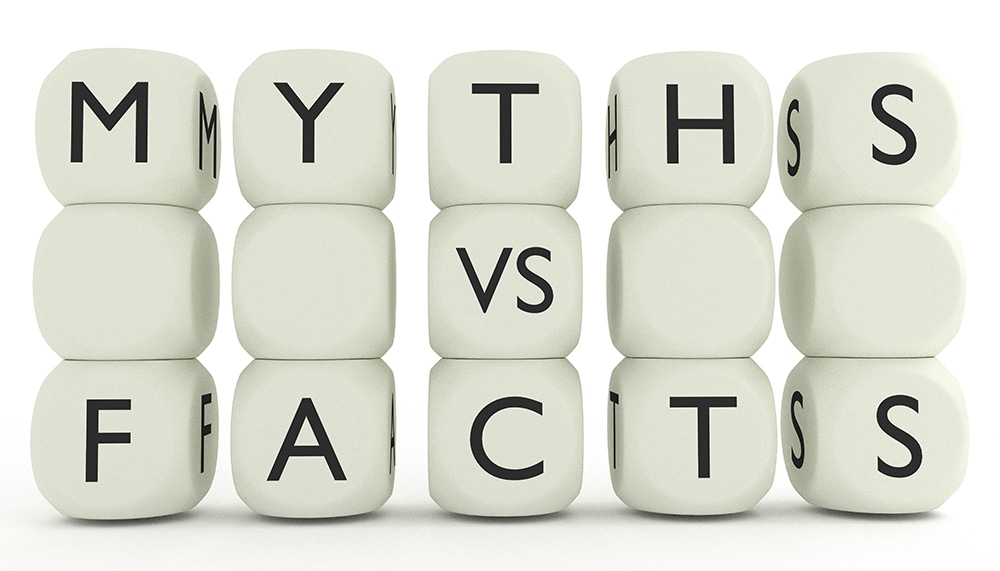Editor’s Note: May is Mental Health Awareness month, throughout the month we will feature insights and best practices to help HR professionals accommodate workers with mental health issues. Today’s focus is on busting mental health myths and later this week, we’ll cover supporting veterans in the workplace. Stay tuned!
All employees, in companies large and small, will experience stress. This stress may be job-related, but more commonly, these human stressors include other elements of employees’ lives: a sick family member; marital strife; financial worry; and, most recently, anxiety over the COVID-19 pandemic.
At such a time of stress, the investments made in your employees’ mental health and well-being can mean the difference between a productive and an unproductive workforce. Stress may not be the cause of mental illness, but it often may act as a precipitant of acute mental distress.
During the past decade, there has been a tremendous uptick in research about the impact of mental health on the American workforce. It’s now an accepted fact that mental health matters. Now more than ever, investing in the mental health of our employees and reducing stigma will help companies bounce back to optimal function. To that end, it’s paramount for Human Resources professionals to know and address myths about mental health conditions.
Myth: Mental Illness Is a Sign of Weakness
Fact: Mental illness affects 1 in 5 U.S. adults and, hence, approximately 20% of people. These are complex conditions with many biological and environmental factors that contribute to development, including genetic risk, brain changes, and social stressors.
Advances in neuroscience and medical evolutionary theory have shown that mental health disorders and certain remarkable human qualities are positively correlated—characteristics such as creativity, persistence, and resilience.
Myth: People with Mental Illness Cannot Work
Fact: Diagnosis of a mental health condition does not preclude individuals from working. Many individuals in the workforce have mental health disorders. Based on severity, these get classified into any mental illness (AMI) and severe mental illness (SMI).
Like any other qualifying Americans with Disabilities Act (ADA) disability, individuals with SMI can have a noticeable impact on cognitive functioning and limitations in learning complex tasks such that multistep complex tasks may need accommodation or reassessment of fit.
Myth: Psychiatric Conditions Are Not Common
Fact: Many individuals who we interact with day to day may deal with depression, anxiety, addiction, and trauma-related symptoms. Mental health or psychiatric disorders are highly prevalent conditions and are the leading cause of disability in the United States.
Currently, the nation is in the midst of an opioid epidemic and the coronavirus pandemic, and rates of depression and suicide are climbing. Growing attention on these issues has increased public awareness and encouraged increased access to care with expanding treatment modalities.
Myth: Persons with Mental Illness Cannot Learn New Skills
Fact: Mental health conditions have a variety of symptoms that vary in intensity from mild to moderate to severe. Persons with mild to moderate symptoms are able to function fairly well in day-to-day life, with no externally observable difference from those without a psychiatric disorder.
Working through mental health problems is in many ways like working through any health challenge. It takes openness, grit, and self-awareness. This capacity for growth can definitely be applied to skill acquisition and future success.
Myth: Mental Illness Leads to Bad Behavior
Fact: Mental health conditions can present with many different symptoms, including mood changes, lack of energy, restlessness, excessive worry, sleep difficulties, impulsivity, etc. Most conditions, especially when treated effectively, are well managed without any behavioral dysregulation.
Myth: You Shouldn’t Talk About Mental Health at Work
Fact: Reaching out to a coworker or an employee who appears to be struggling, inquiring about the person’s well-being, and offering support can improve outcomes. Outreach is critical to developing an organizational culture of caring.
The “Notice. Talk. Act.” approach developed by the American Psychiatric Association Foundation can be instrumental in providing a way to approach coworkers. The goal is to Notice any behavior or performance changes; Talk in private expressing concern and care, attempting to understand the situation from their vantage point; and finally Act by connecting them with your employee assistance program (EAP) or encouraging them to seek help. Privacy of health information should always be kept in mind.
Myth: Mental Health Is Not Important in the Workplace
Fact: Recent studies show that investing in employee mental health may be the best financial investment a company can make in its own well-being. When employees receive timely intervention and effective treatment for mental health conditions, total savings from reduced medical bills, lower absenteeism, and increased productivity far outweigh the cost of providing that mental health care.
Myth: Nothing Can Be Done to Improve Mental Health in the Workplace
Fact: Mental health is hard but not impossible. What makes improving mental health and well-being possible is people letting go of unjust stigma (“myths”) and implementing programs aimed at promoting our workforce to care for themselves and others.
There are structured programs and great resources ready for implementing, like “Notice. Talk. Act.,” many of which are waiting for creative and caring individuals to operationalize (and improve upon) in their own workplace.
For Human Resources professionals, gaining factual understanding of mental illness and well-being can help create a more welcoming and inclusive environment. At an organizational level, implementing wellness initiatives that account for both physical and mental well-being can improve productivity and job satisfaction. More than busting myths with our understanding, we need to bust myths with our actions. What myths will you bust today?
| Dr. Jasleen Chhatwal is chief medical officer and director of the mood program at the Arizona-based behavioral health treatment center Sierra Tucson. For more information, visit https://www.sierratucson.com. |
The post Myth-Busting Session: Mental Health in the Workplace appeared first on HR Daily Advisor.
